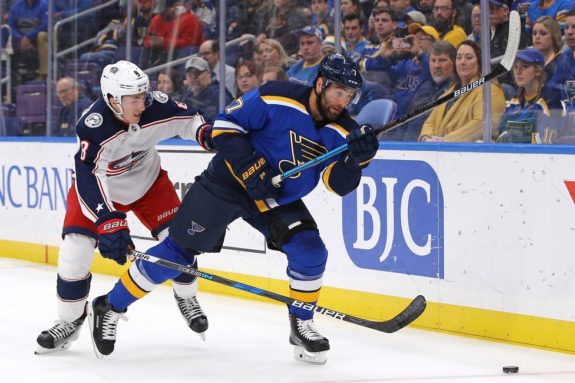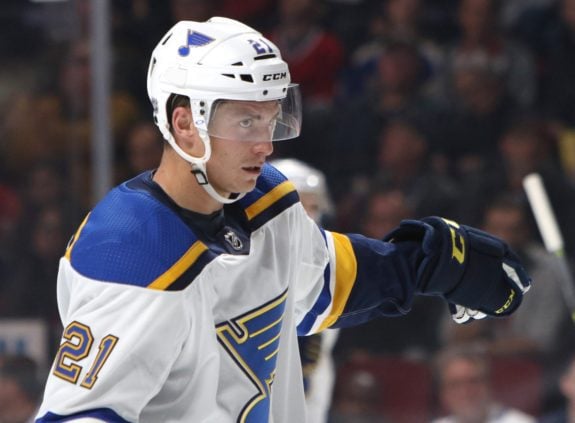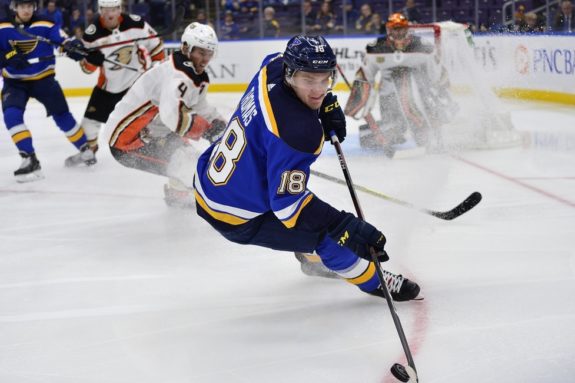The 2018-19 St. Louis Blues won the Stanley Cup Championship, the first in the history of the franchise. But, naturally, some players made a bigger contribution than others. In this series, we’ll look at the Blues’ star players, and see who made the grade and who needs to retake the test.
It’s probably not true that Robert Thomas was the reason the St. Louis Blues’ long Stanley Cup drought ended. But it is true that for 51 years, the Blues had neither Thomas nor a Stanley Cup championship, and that both arrived on the scene in the Gateway City in the 2018-19 season.
Thomas’ rookie season wearing a Blue Note ended in the best way possible. But was the glorious end an accurate encapsulation of the whole? Let’s take a closer look at the debut season for the promising youngster.
Thomas’ Promise
The Blues’ 20th overall pick in the 2017 NHL Draft arrived in St. Louis with a lot of hype. Thomas’ championship pedigree was well established before he ever touched the Stanley Cup. A veteran of the London Knights and the Hamilton Bulldogs, he won a Memorial Cup in London in 2016 before winning the OHL Championship again with the Bulldogs in 2018. In that run, he put up 31 points in 22 games and won recognition as the Playoff MVP, taking home the Wayne Gretzky 99 Award. That same season, he won gold for the Canadian World Junior team alongside fellow Blues’ prospect Jordan Kyrou.

With all of those trophies in his cabinet, it’s easy to see why many viewed Thomas as the best of the Blues’ loaded prospect group entering his rookie season. He had the speed, skill, and hockey IQ to become a top-level center at the NHL level.
But early in the season Thomas’ play mirrored the Blues’ struggles overall. He had just three points in his first eight games, all assists, and the Blues were forced to consider whether Thomas might need another year of seasoning at the junior level. The team needed to decide before he played his tenth game at the NHL level, or he would burn a year of his NHL contract. So they scratched him for multiple games in a row while they weighed their decision.
Ultimately, the Blues chose to stick with Thomas, and he rewarded their decision. He scored his first career goal against the Nashville Predators on Nov. 21, and began to find more consistency. He scored 11 points combined in November and December, and after a brief stint with injury in January, looked like he completely had his feet under him late in the season.

Patrick Maroon (Billy Hurst-USA TODAY Sports) 
Tyler Bozak (Jean-Yves Ahern-USA TODAY Sports) 
Robert Thomas (Jeff Curry-USA TODAY Sports)
This was clearest in the month of March. The Blues paired Thomas with teammates Tyler Bozak and Patrick Maroon, and the trio found instant chemistry. Thomas had his best month of the season by far, scoring four goals and eight assists for 12 points in 15 games, and he helped revitalize the struggling Maroon’s season.
Postseason Star
When the playoffs began, the Blues’ third line was a major cog in their offensive success. And it quickly became apparent that Thomas was every bit the star that was advertised. The trio were the deciding factor in the Blues’ defeat of the Dallas Stars in the second round of the playoffs. He scored his first career playoff goal in Game 4, but that wouldn’t be his iconic playoff moment.
With 14:16 remaining in the second overtime period of a sudden death Game 7, it was Thomas and company on the ice for a draw in front of Stars’ goaltender Ben Bishop. Bozak won the draw towards Maroon, who tipped the puck over to Thomas. He took the puck and moved around toward the board, while Maroon knocked Stars defenseman John Klingberg out of his path. Thomas cut in front and took a brilliant shot past Bishop before another rookie sensation, Miro Heiskanen, could close on him. The shot beat Bishop but not the post. Fortunately, with the puck sitting behind the helpless goaltender, Maroon was there to clean up the rebound, and the rest was history.
While fans will rightly remember Maroon as the hometown hero who sent the Blues onto the Western Conference Final and ultimately their first ever Stanley Cup, it was Thomas’ deft skating and movement that created the goal. But after the game, he had nothing but praise for his teammate Maroon.
It doesn’t get any better than that. Game 7 double OT goal in your hometown. That’s pretty special. I don’t even know how he’s feeling, he’s probably jumping over there.
Robert Thomas after Game 7 of the second round
The line’s success slowed a bit during the third round, and it became clear that Thomas was not 100 percent healthy. He began missing practices before every game, and his production on the ice slowed. But he continued to play, until a devastating hit from Torey Krug in Game 1 of the Stanley Cup Final knocked him out for most of the series. He made a failed attempt at a return in Game 6, but was held out again for the decisive Game 7 of the series, an unfortunate end to a great rookie season.
Analysis
Robert Thomas began his rookie season with a lot of hype. But like with the team as a whole, it was a rocky start. Though the team briefly considered sending him back down to the OHL, Thomas earned his spot, and eventually scored 33 points in 70 games in the regular season.
During the playoffs, it was Thomas’ line that drove the play much of the time he was healthy. And of course it was Thomas himself who set up the decisive goal in the second round against the Stars. For that alone, he earns high marks from Blues fans.
While there was some production left on the table, Thomas’ first season in St. Louis displayed all the tools that made him such a highly-touted prospect, and Blues fans should be eager to see more from their budding star.